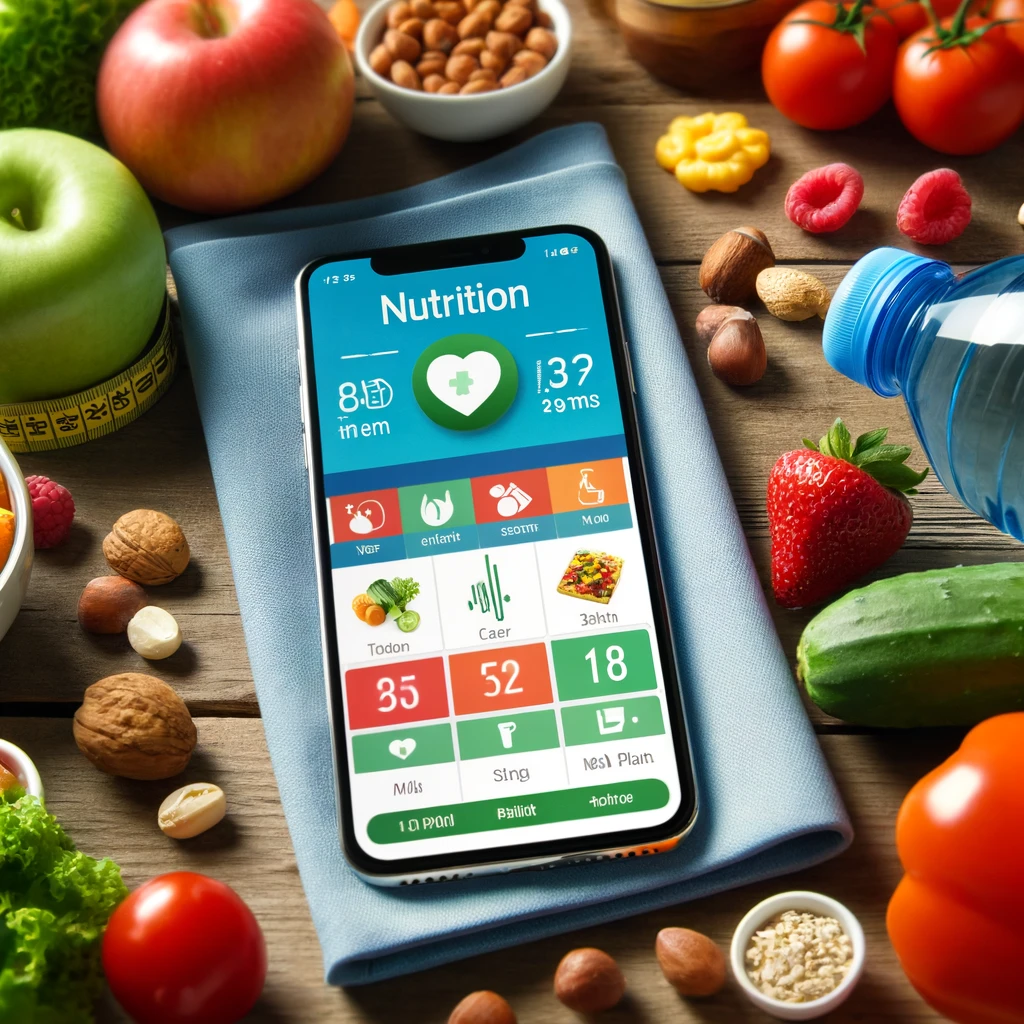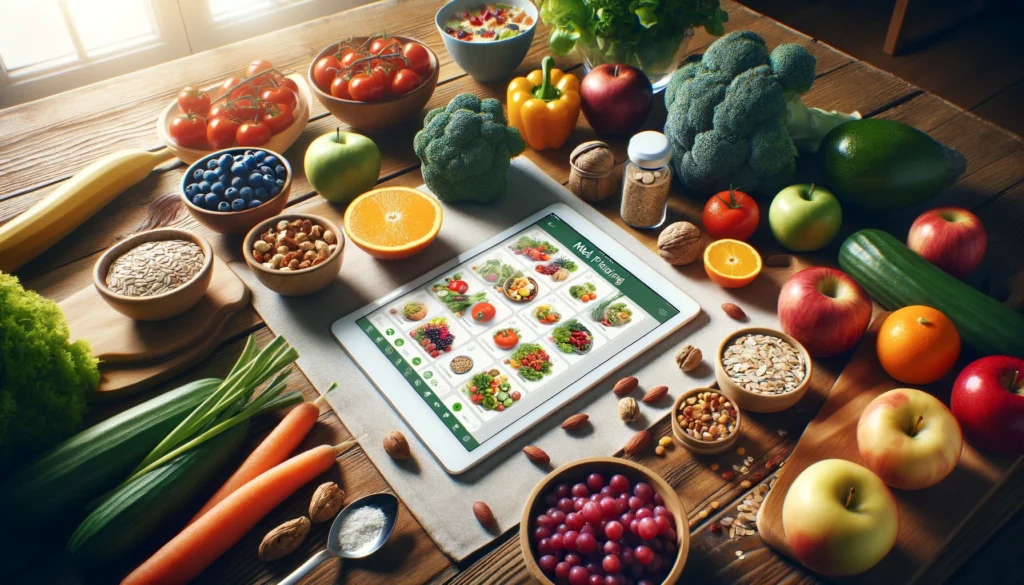Nutrition at your fingertips is more than a digital expression; it’s a transformative reality in our modern lives. With the help of advanced nutrition apps, you can monitor your diet, obtain healthy recipes, and even receive personalized advice, all from your smartphone. These modern tools make it easier than ever to maintain a balanced diet and achieve your health goals. In this article, we’ll delve into some of the most effective nutrition apps available and how they can help you take control of your diet.
These apps not only simplify the process of following a diet but also provide valuable insights into your eating habits. You can track calories, macronutrients, and even micronutrients with precision. Additionally, many of these apps offer personalized meal plans tailored to your dietary needs and preferences, making the journey to healthy eating less intimidating and more manageable. With the rise of these apps, you no longer need to rely on guesswork or traditional methods to ensure you’re eating right; you have a powerful tool at your disposal.
Let’s explore some of the best nutrition apps that can truly make a difference in your diet. From the most popular to the lesser-known, each offers unique features that can help you adopt healthier and more sustainable eating habits. Whether you’re looking to lose weight, build muscle, or simply improve your overall health, there’s an app out there that can cater to your needs.
Nutrition Apps You Need to Know
Nutrition apps are revolutionizing how we manage our diets. Let’s dive into some of the most effective ones available on the market.
MyFitnessPal is one of the most popular apps for tracking your daily food intake and physical activities. It boasts an extensive database of foods, making it easy to log everything you consume. The barcode scanning feature allows you to add foods quickly and easily. Beyond simple calorie counting, MyFitnessPal offers detailed reports on your nutrient intake, helping you maintain a balanced diet. The app also lets you log your exercises, integrating data from various fitness devices and other health apps. Additionally, MyFitnessPal provides a supportive community where users can share their achievements and find motivation.
Another noteworthy app is Yazio, which focuses on offering personalized meal plans. Yazio stands out for its user-friendly interface and healthy recipe recommendations. The app allows you to set goals for weight loss, muscle gain, or maintenance, adjusting its recommendations based on your progress. Yazio also provides a wide range of recipes catering to different dietary preferences, including vegetarian, vegan, and low-carb options. The intuitive design and ease of use make meal planning simple and enjoyable. Moreover, Yazio includes features like fasting trackers and personal diet plans tailored to your specific needs.
For those who seek a more detailed analysis of food quality, Fooducate is an excellent option. This app not only tracks calories but also evaluates the nutritional quality of the foods you consume. Fooducate uses a grading system to categorize foods and offers healthier alternatives. Additionally, the app provides detailed information on ingredients and food additives, allowing you to avoid processed foods and choose more natural, wholesome options. Fooducate also includes a community feature where users can ask questions, share tips, and get advice from others.
Features That Make a Difference
The promise of nutrition apps goes beyond simple calorie tracking. They offer a range of features that can transform your relationship with food.
Many of these apps, like Lose It!, provide the option to set and monitor long-term goals. Lose It! uses scientific data to calculate your daily caloric needs and adjusts these goals as you progress. The app also features an active community where you can share your achievements and get support from other users. Lose It! integrates with various fitness devices, giving you a comprehensive view of your health. The app also offers premium features like meal planning, goal setting for macronutrients, and detailed reports on your progress.
Another interesting feature is the personalization of meal plans. Lifesum, for example, adjusts its recommendations based on your dietary preferences, whether you are vegetarian, vegan, or following a low-carb diet. Lifesum also offers recipes tailored to your goals, making it easier to stick to a healthy diet. Additionally, the app tracks your water intake, ensuring you stay hydrated throughout the day. Lifesum’s premium version includes more detailed nutritional information, advanced tracking options, and personalized diet tips based on your progress and goals.
Integration with fitness devices is another significant advantage. Apps like Noom sync with your smartwatch or activity tracker to provide a complete picture of your health. Noom combines food tracking with daily lessons on nutrition and psychology, helping you understand your eating habits and make lasting changes. Noom’s unique approach focuses on behavioral changes, offering personalized coaching and continuous feedback. The app includes interactive content, quizzes, and challenges to keep you engaged and motivated throughout your weight loss journey.

Personalization and Support for Different Diets
One of the biggest benefits of nutrition apps is the ability to tailor recommendations to your specific needs and dietary preferences. Let’s explore some of the apps that excel in this aspect.
MyPlate, developed by the United States Department of Agriculture (USDA), helps plan a balanced diet based on government dietary guidelines. It allows you to adjust your nutrient intake goals and offers meal suggestions that meet these goals. MyPlate also includes a physical activity tracker, helping you balance caloric intake with energy expenditure. The app provides daily tips and recommendations to improve your eating habits and make healthier choices.
For those following specific diets like ketogenic or paleo, Carb Manager is an excellent choice. This app specializes in tracking carbohydrate intake and provides detailed data on the net carbs consumed. Carb Manager also offers recipes compatible with low-carb diets and personalized meal plans, making it easier to adhere to these restrictive diets. The app includes features like macro tracking, meal planning, and progress reports, helping you stay on track and achieve your dietary goals.
PlateJoy stands out for its level of personalization. It offers meal plans based on your dietary preferences, restrictions, and health goals. PlateJoy also creates personalized shopping lists and syncs with grocery delivery services, making meal planning and shopping more convenient. Additionally, the app provides nutrition coaching from registered dietitians, offering professional guidance to help you reach your health objectives. PlateJoy includes features like allergen tracking, calorie counting, and detailed nutritional analysis, making it a comprehensive tool for managing your diet.
The Importance of Nutrition Education
One of the primary advantages of nutrition apps is the educational component they provide. Using these apps, you can learn more about the foods you eat and how they affect your health.
Cronometer is an excellent example of an app that offers detailed insights into your diet. It tracks a wide range of nutrients, including vitamins and minerals, providing a complete picture of your nutritional intake. Cronometer offers detailed charts and reports that help you understand your nutritional needs and make adjustments to your diet. The app also allows you to track your biometrics and health markers, giving you a comprehensive view of your health and wellness.
Another educational app is Nutrita, which provides detailed information about the nutritional density of foods. It uses a science-based approach to help you choose foods that are rich in nutrients and low in empty calories. Nutrita also offers support for specific diets, such as ketogenic, and provides personalized recommendations based on your health goals. The app includes features like macro tracking, meal planning, and detailed nutritional analysis, making it a valuable tool for improving your diet.
Promoting Sustainability
In addition to improving individual health, some nutrition apps also promote sustainability. Let’s explore some of these apps that encourage more sustainable food choices.
OLIO is an app that helps reduce food waste by allowing you to share surplus food with neighbors. OLIO facilitates the exchange of food that would otherwise be discarded, promoting a more sustainable and conscious community. The app also provides tips on proper food storage and recipes for using leftovers, helping you make the most of the food you have.
Another sustainability-focused app is Too Good To Go, which connects users with restaurants and supermarkets that have surplus food. Too Good To Go allows you to purchase these foods at reduced prices, helping to combat food waste and promote a circular economy. The app is easy to use and provides a practical way to make a positive impact on the environment. Too Good To Go includes features like real-time updates on available food, personalized notifications, and detailed information about participating businesses.
A Healthier Future Within Reach
Adopting a nutrition app can be a crucial step toward a healthier life. With so many options available, you can find a tool that perfectly fits your needs and preferences. These apps not only make it easier to manage your diet but also educate and motivate you to make more conscious choices.
Imagine having a virtual nutritionist available 24/7, ready to help at any moment. With these apps, you can plan your meals, track your progress, and even get support from a community, all at your fingertips. Embrace technology to transform your diet and achieve your health goals more effectively and enjoyably.

Frequently Asked Questions
1. What is the best nutrition app?
The best nutrition app depends on your needs. MyFitnessPal is excellent for general tracking, while Yazio is great for personalized meal plans, and Fooducate focuses on food quality.
2. Are nutrition apps free?
Many nutrition apps offer free versions with basic features, but they also have premium subscriptions that unlock advanced functionalities.
3. How do nutrition apps help maintain a healthy diet?
They help you monitor food intake, provide healthy recipes, allow you to set health goals, and offer detailed nutritional information, making it easier to stick to a balanced diet.
4. Is it safe to provide my personal data to nutrition apps?
Yes, as long as you use reputable apps and review their privacy policies. Most apps respect user privacy and protect your data.
5. Can I use these apps without an internet connection?
Some apps offer offline functionalities, but most require an internet connection to access all features and sync data


